Hi Everyone,
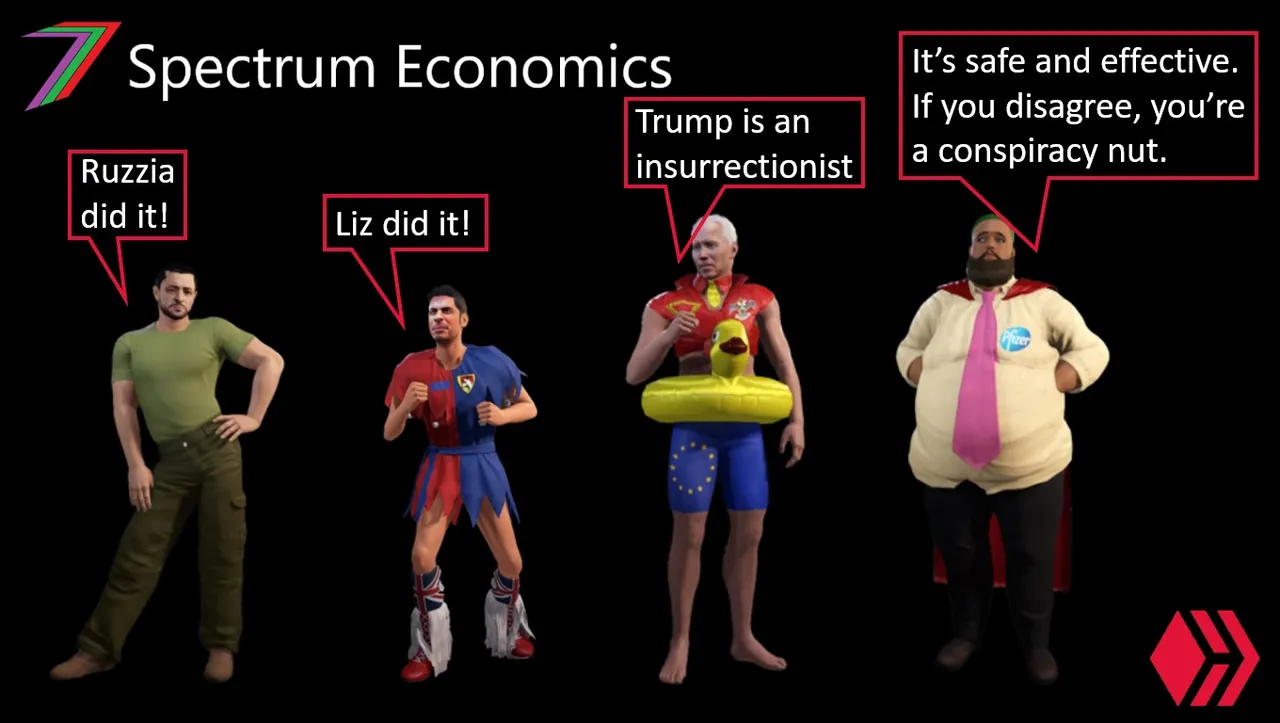
Government and mainstream media normally use the terminology ‘conspiracy theory’ as a derogatory term to refer to information that opposes or discredits their narratives, ideologies, or agendas. This information usually comes from outside of mainstream political parties and media sources. Media supportive of either side of politics, i.e. ‘left-wing’ or ‘right-wing’, typically ridicule it.
Despite the ridicule, ‘conspiracy theories’ are gaining more exposure and more support from the public. Figure 1 shows the growth in the usage of the terminology ‘conspiracy theory’ and ‘conspiracy theorist’ in books using Google Ngram Viewer. Figure 2 shows the change in frequency of usage in the terminology ‘conspiracy theorist’ in google searches. Figure 3 contains the countries where ‘conspiracy theorist’ is most frequently searched.
Figure 1: Usage of terms ‘Conspiracy Theory and ‘Conspiracy Theorist’ in Google Books
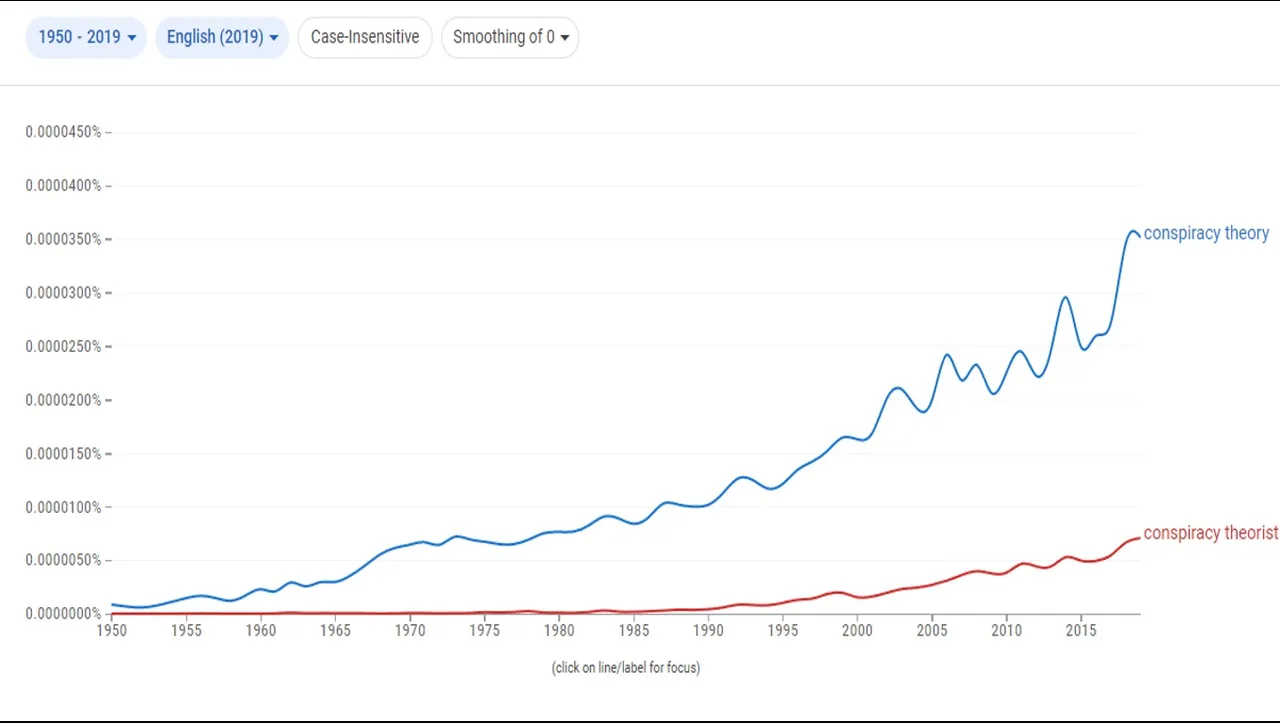
Source: Google Books Ngram Viewer
Figure 2: Google searches for ‘Conspiracy Theorist’
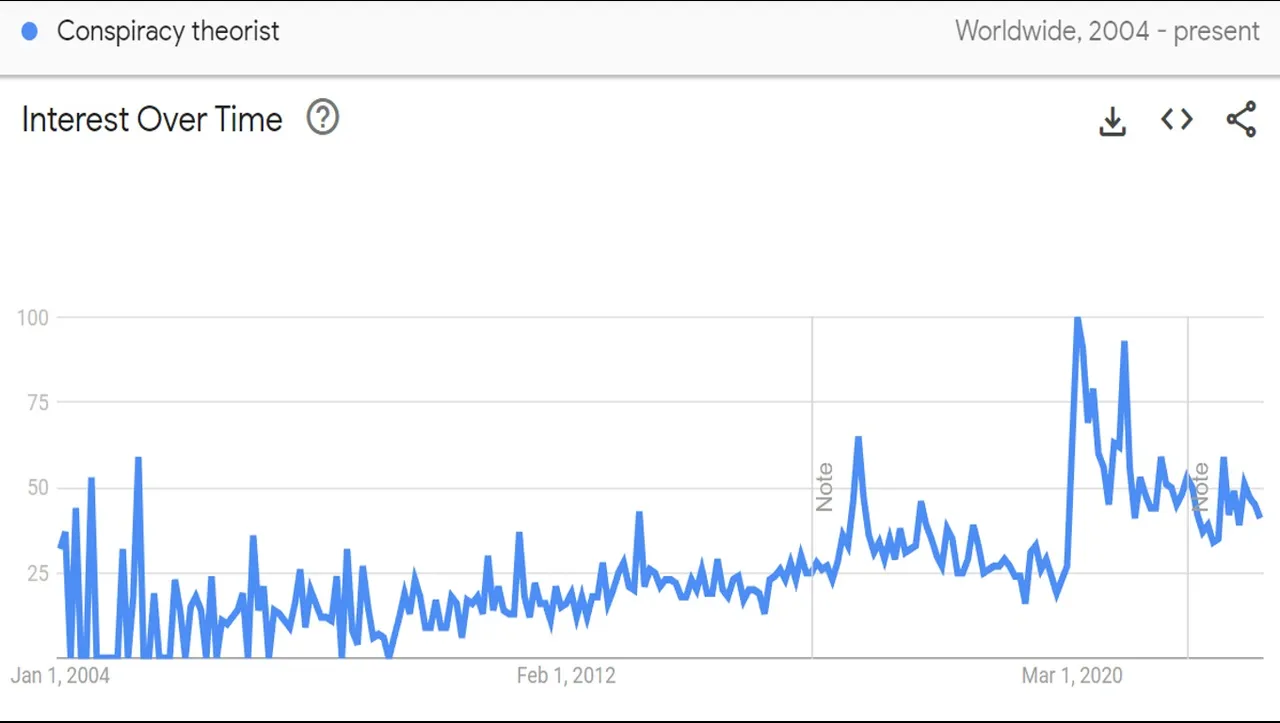
Source: Google Trends
Figure 3: Countries that most frequently search for ‘Conspiracy Theorist’ on Google
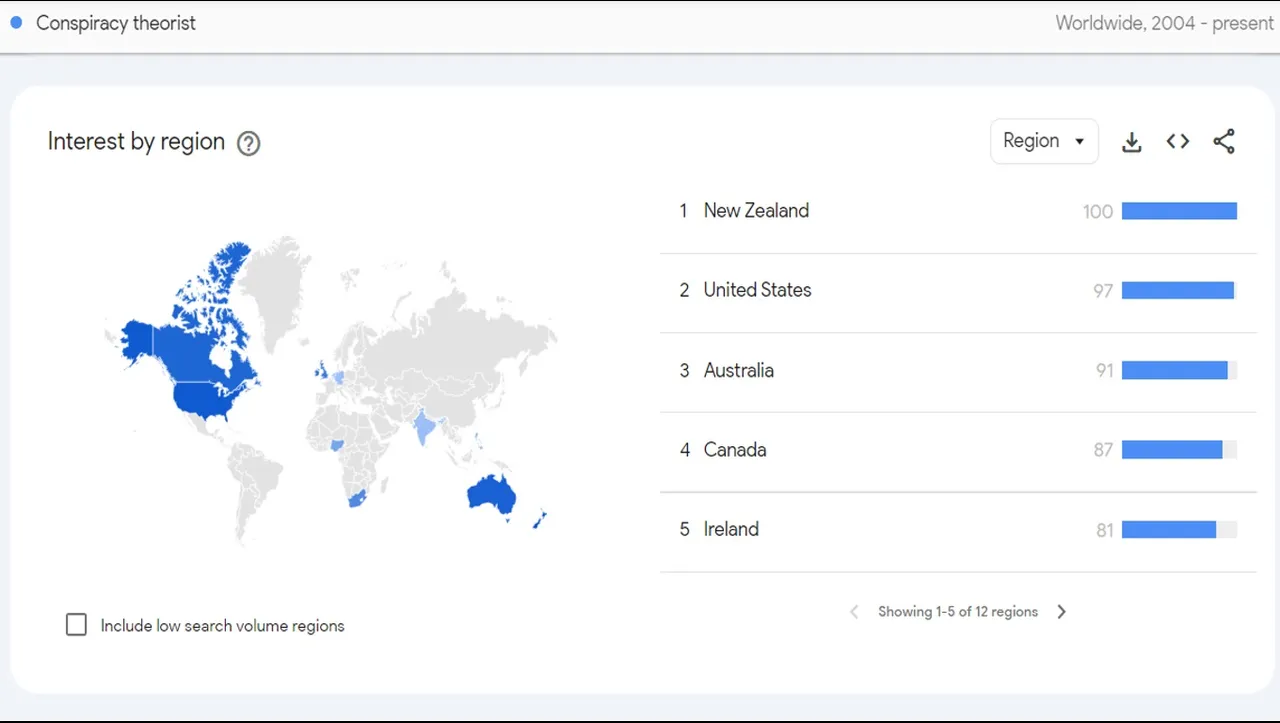
Source: Google Trends
People from English speaking western countries appear the most interested in searching for ‘conspiracy theorists’; thus, indicating a stronger interest in the information alleged conspiracies theorists might be spreading. It is likely that the number of ‘conspiracy theories’ and the number of people believing these conspiracies has increased to the point that they have been deemed to pose a threat to the Establishment.
In recent years, some of the media-proclaimed ‘right-wing’ parties have shown support for some ‘conspiracy theories’. An official form of support for some ‘conspiracy theories’ controls the threat from the people. It creates the impression that someone officially represents their concerns and is willing to fight corruption from within the Establishment. These parties become controlled opposition. In my post, Are the ‘right-wing’ hijacking conspiracy theory to maintain the two party system?, I discuss how the Republican Party candidate Donald Trump used his support for ‘conspiracy theories’ to become president of the USA.
In this post, I discuss how ‘conspiracy theories’ are used and often being weaponised. I believe there are two main ways this is being done. The first is the application of ‘conspiracy theories’ to create distrust, discredit or villainise people, attract attention, create a distraction, or create division. The second is the usage of the terminology ‘conspiracy theory’ to discredit information and people.
Definitions
Before we discuss the topic any deeper, we should clarify what is meant by conspiracy and conspiracy theory. To do so we can use definitions found in recognised dictionaries. Below are definitions from dictionary.com, Oxford Dictionary, Collins Dictionary, and Cambridge Dictionary.
Conspiracy
A conspiracy is an unlawful, harmful, or evil plan formulated in secret by two or more persons (dictionary.com).
A conspiracy is a secret plan by a group of people to do something harmful or illegal (Oxford Learners Dictionary).
A conspiracy is an agreement between a group of people which other people think is wrong or is likely to be harmful (Collins Dictionary).
A conspiracy is the activity of secretly planning with other people to do something bad or illegal (Cambridge Dictionary).
Conspiracy Theory
A theory that rejects the standard explanation for an event and instead credits a covert group or organization with carrying out a secret plot (dictionary.com).
A conspiracy theory is the belief that a secret but powerful organization is responsible for an event (Oxford Learners Dictionary).
A conspiracy theory is a belief that a group of people are secretly trying to harm someone or achieve something. You usually use this term to suggest that you think this is unlikely (Collins Dictionary).
A conspiracy theory is a belief that an event or situation is the result of a secret plan made by powerful people (Cambridge Dictionary).
In the context of ‘conspiracy theory’, the word ‘theory’ is used to indicate someone’s belief that conspiracies are taking place or have taken place. Arguably, this is the wrong use of the word ‘theory’. Theories are more than just beliefs. Theories are used to explain phenomenon and are supported by evidence. This gives them some credibility. Theories are also not facts. Unlike facts, theories can be challenged. Challenges can lead to them being disapproved or could further increase their credibility.
The use of the terminology ‘conspiracy theory’ would imply that some evidence exists that a group of people have plotted or committed harmful or illegal activities. However, the derogatory use of the terminology implies the conspiracy claims are obviously false. Maybe, the terminology ‘conspiracy belief’ or even ‘conspiracy fantasy’ should be used instead.
We could use a range of terminology. We could have ‘conspiracy hypotheses’ for suspected conspiracies that still require more evidence. We could have ‘conspiracy facts’ for conspiracies that have been definitively proven true. We could have ‘conspiracy propaganda’ for conspiracies that are unfounded but the propagators want us to believe.
For the purpose of this post, I will use the definition of ‘conspiracy theory’ used by most dictionaries even though it more closely aligns with ‘conspiracy belief’.
Why do people make up conspiracy theories?
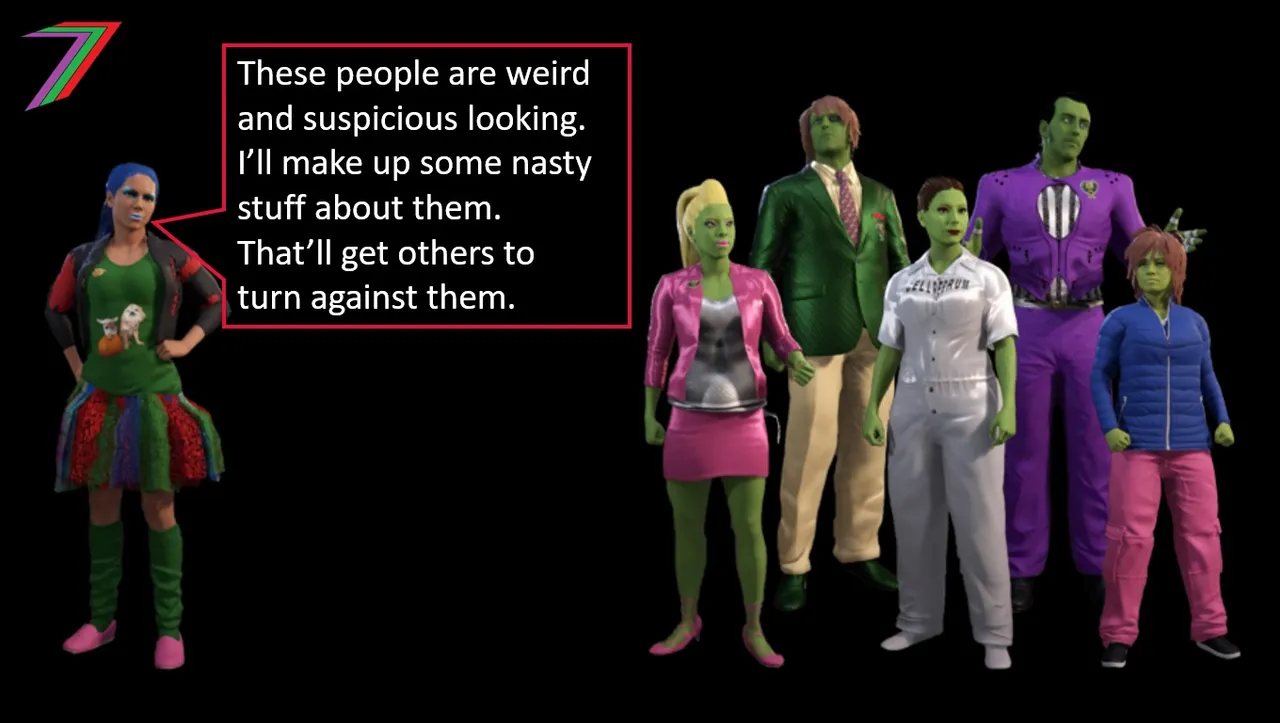
There are many possible reasons why people or groups of people could make up or spread conspiracy theories. In this post, I discuss a handful of these reasons; see below.
- Lack of trust in authority
- Discredit or villainise people
- Attention seeking
- Deflection and distraction
- Divide the population
Lack of Trust in Authority
The first reason would be the extent of secretive and dishonest behaviour and actions by Governments, big business, religious institutions, and mainstream media. Secretive and dishonest behaviour destroys trust. When trust is destroyed, people are more likely to consider hidden nefarious motives for many, most, or all future actions.
To reduce these types of conspiracy theories, trust needs to be restored. This might involve removing the people (politicians, media personalities, executives, etc…) that have triggered this distrust. For most Governments, lack of trust is linked to failed governance systems. Changing the leaders in Government will make little difference unless these leaders are willing to change the systems. I discuss the problems with existing systems in the following posts:
The Two-Party Political System – The dictatorship we didn’t know we had
Blockchain Government – Part 1: Breaking Down the Existing System
Discredit or Villainise People
The second reason would be to attack opponents, opposition, or competition. Conspiracy theories can be used as accusations of wrongdoing. This is to discredit or villainise particular people or groups as an attempt to gain personal support or reduce support for the ones being attacked. These accusations can be serious. For example, the conspiracy theory that cave dwelling terrorists in Afghanistan brought down the New York World Trade Centre Twin Towers and Building 7 with two hijacked commercial planes (The Activist Post).
The most aggressive conspiracy theories I can think of relate to Russia/Russian Government. These include interference in the 2016 USA Presidential Election (New York Post) and more recently the Nord Stream Pipeline attack (Seymour Hersh). Anyone who questions the West's support for the Kyiv Regime are accused of conspiring with Russia; Elon Musk being the latest victim of such wild claims (Daily Mail).
People of different cultures are easier to attack because we know less about them. Their customs and behaviour may appear strange and not align with our values. This could create the false impression that that these cultures are oppressive to their own people, as they we are judging them based on our own standards and expectations. For example, from a western perspective, Russia may appear as an oppressive dictatorship. The majority of Russian people would not agree with this perspective as can been seen from Vladimir Putin’s approval ratings (Statista).
To reduce the effectiveness and proliferation of these types of conspiracy theories, people need to become more aware of different cultures and what the people in these cultures value. Just because people believe in different things does not mean they are a threat to our way of life. People only become a threat to our way of life if they impose their values upon us.
Attention Seeking
The third reason would be to attract attention through controversy. Conspiracy theories are nearly always controversial. Controversy attracts attention. Media and social media thrive from increased attention. These conspiracy theories could be about virtually anything. They could vary from celebrities faking their own deaths to cover-ups of alien sightings to flat earth theories. Many of these are not intended to be malicious.
When presented with any information, people need to determine if they consider it relevant to themselves, their work, or personal interest. If not, they could probably ignore it. If it is relevant, people should research the information to determine how likely, it is to be true.
Deflection and Distraction
The fourth reason would be deflection and distraction. As mentioned in the previous reason, conspiracy theories attract attention. Therefore, they can be very useful for creating distractions. Arguably, the majority of conspiracy theories originate in the media or on social media. Time dedicated to these conspiracy theories is time taken away from something else. The ‘something else’ could be considerably more relevant to most people than the conspiracy theory. We also have limited time. If we are distracted by a conspiracy theory, we have less time to pay attention to something else that is already being given less exposure.
Media and social media distractions can come in many forms. Conspiracy theories are just one type of distraction. The attention thrown at these conspiracy theories is often excessive compared to their actual relevance to most people’s lives. Conspiracy theories that relate to celebrities or the entertainment industry often receive plenty of attention because people are generally interested in their lives. However, the personal lives of these people have little or no bearing on our own lives. Meetings between villainised world leaders such as Vladimir Putin and Kim Jong Un are reported as plots to attack our way of life when they are more likely just meeting to improve trade between their countries (AP News). While these events are playing out in the media, an important debate might be overlooked or a bill may have been passed almost unnoticed and barely reported.
Divide the Population
The fifth reason would be to divide the population. Populations become divided based on belief in a conspiracy theory. One side adamantly believes the conspiracy theory and the other side adamantly opposes it. This builds distrust, anger, and in some cases hatred between the two groups. This works well for the people that started the conspiracy theory. It maintains the two party and two ideology (left vs. right) systems that are used to control the population. Divided populations are easier to control than united ones.
A good example of how conspiracy theories have been used to divide populations is the January 6th 2021 riots at the US Capitol Building in Washington. According to conspiracy theorists (in this case, the Democrat Party and most mainstream media), these riots were an attempted insurrection incited by the outgoing President Donald Trump. There was no attempted insurrection; it was a protest that became a riot in response to the belief that the Presidential Election was rigged (another conspiracy). Donald Trump was not found guilty of inciting an insurrection or even the riot itself (Global Research).
This conspiracy theory has served the purpose of attacking Donald Trump as well as dividing the population regarding the intentions of the protestors. This also further divided the population regarding the alleged fraud that took place during the Presidential Election. Those who believe fraud took place, see the insurrection claims as further evidence of their belief. Those who do not believe the fraud took place believe Donald Trump and his supporters are trying to overturn a fair and democratic election.
There is substantial evidence supporting the alleged fraud claim, I briefly discuss this in one of my Actifit Posts. I believe the conspicuousness of the fraud was deliberate to ensure that a sufficient number of people would support the fraud claim. Thus, create even greater division between two groups of people.
Why Accuse Someone of Spreading Conspiracy Theories?
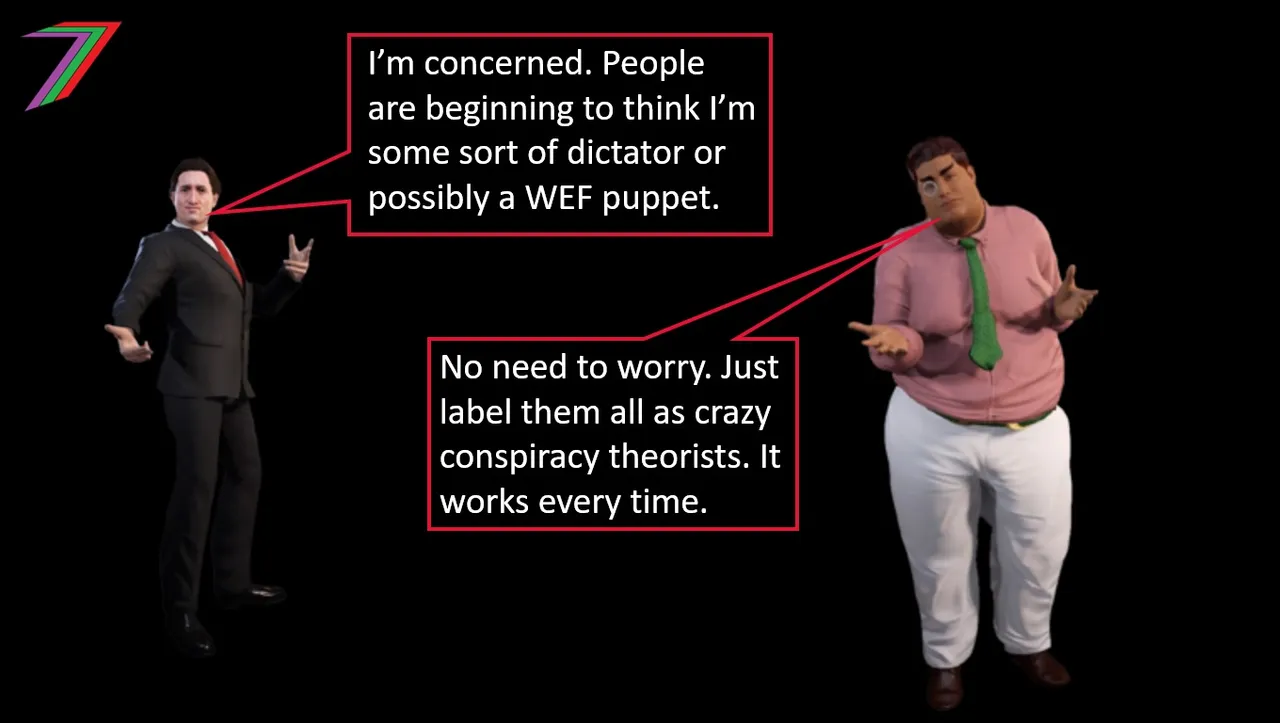
Accusations of spreading conspiracy theories can be accurate or false. There are plenty of conspiracy theories and theorists in the world. Conspiracy theories are typically misleading and could easily be perceived as being dangerous. Accusing someone of being a conspiracy theorist discredits the person as well as any message or information that person might be sharing.
Calling someone a conspiracy theorist is quite a serious accusation. Such accusations should be supported by evidence. The best way to do this is to debunk the conspiracy theories. This can be done by:
- presenting alternative evidence
- highlighting the flaws in the evidence being used to support the conspiracy theory
- stating where the evidence supporting the conspiracy theory is lacking
- explain possible misinterpretation of evidence (e.g. correlation vs causation)
- question the techniques of acquiring the evidence and the sources for this evidence
All of this should be done openly so that people can see the evidence presented by the alleged conspiracy theorist as well as the evidence that might contradict the claims they are making. People can then decide for themselves if the conspiracy has any merit or if it is just some unsupported claim.
The worst approach to reducing conspiracy theories is the censorship of them and their alleged conspiracy theorists. Censorship reaffirms the conspiracy. It demonstrates that information and opinions are being covered up. Thus, verifies the validity of the conspiracy. Censorship also prevents any proclaimed evidence supporting the conspiracy from being challenged adequately and openly. This is likely to create echo chambers for these conspiracy theories.
The likelihood of censorship of a conspiracy depends on the origin of the conspiracy theory and the purpose it intends to serve. Conspiracy theories targeting the Establishment are easier to censor. This is because the Establishment have the means to do so. However, it is often not in their best interests to censor negative conspiracy theories. This is because they can debunk them. Successfully debunking conspiracy theories gives the Establishment more credibility. It makes their opposition weaker as they have proven their claims are false. This reduces the credibility of anyone trying to expose actual conspiracies.
Conspiracy theories that originate from the Establishment, most likely the mainstream media will not face censorship, unless there is a strategic reason to do so. These conspiracy theories have a purpose and are likely to be spread as widely as possible. In order for this to occur, censorship is placed on the people and information that counter these conspiracy theories.
Conspiracies that can be supported by strong evidence are often censored. For example, mainstream media and many social media platforms censor conspiracies regarding Covid-19, the Ukraine war, and net zero. People that have strong evidence do not get to present this evidence to a large mainstream audience. ‘X’ (formerly known as Twitter) is the only mainstream social media platform to give these people a voice.
Tucker Carlson is an example of someone who was taken off mainstream media (Fox News) and has been given a voice on ‘X’. I would argue that Tucker Carlson is more likely to be part of the controlled opposition rather genuine opposition to the Establishment. He worked for mainstream media for over twenty years (Wikipedia). His on air views do not always appear consistent with what he has been claimed of saying off camera (Intelligencer). I would also argue that ‘X’ is not a true free speech platform. It is still centrally controlled and censorship is still introduced at the whim of its new owner Elon Musk.
The Covid-19 fiasco has been one of the most shocking displays of widespread human oppression in modern history. Countries are still feeling the fallout of the Covid-19 fiasco with the cost of living crisis and the current health crisis. The biggest part of that was the manipulation and coercion of people to take the Covid-19 jabs.
Andrew Bridgen has been the only sitting member of parliament for the UK who has challenged the effectiveness and safety of the jab, the prolonged high number of excess deaths, and the proposed pandemic treaty with the World Health Organisation (WHO). Whenever he raises these topics in parliament, he is jeered and mocked by other members of parliament. He was been called a conspiracy theorist and even anti-Semitic (Andrew Bridgen YouTube Channel). On 17th March 2023, there was a debate regarding the efficacy of mRNA boosters. Almost all members of parliament choose to boycott this debate.
Mark Steyn was formerly a primetime host for GB News. He was forced out of his job because his show was being investigated for not complying with Ofcom’s rules (regulator for communicator services in the UK (Ofcom)). One of the investigations related to his probing into the safety of the Covid-19 jabs (Press Gazzette). He has been accused of promoting conspiracy theories on his show by interviewing guests that have expressed views contrary to mainstream media narratives (News Week). After leaving GB News, Mark Steyn started his own show from YouTube. However, he is still bound by rules regarding what topics he can explore and what language he can use.
Are Conspiracy Theories Dangerous?
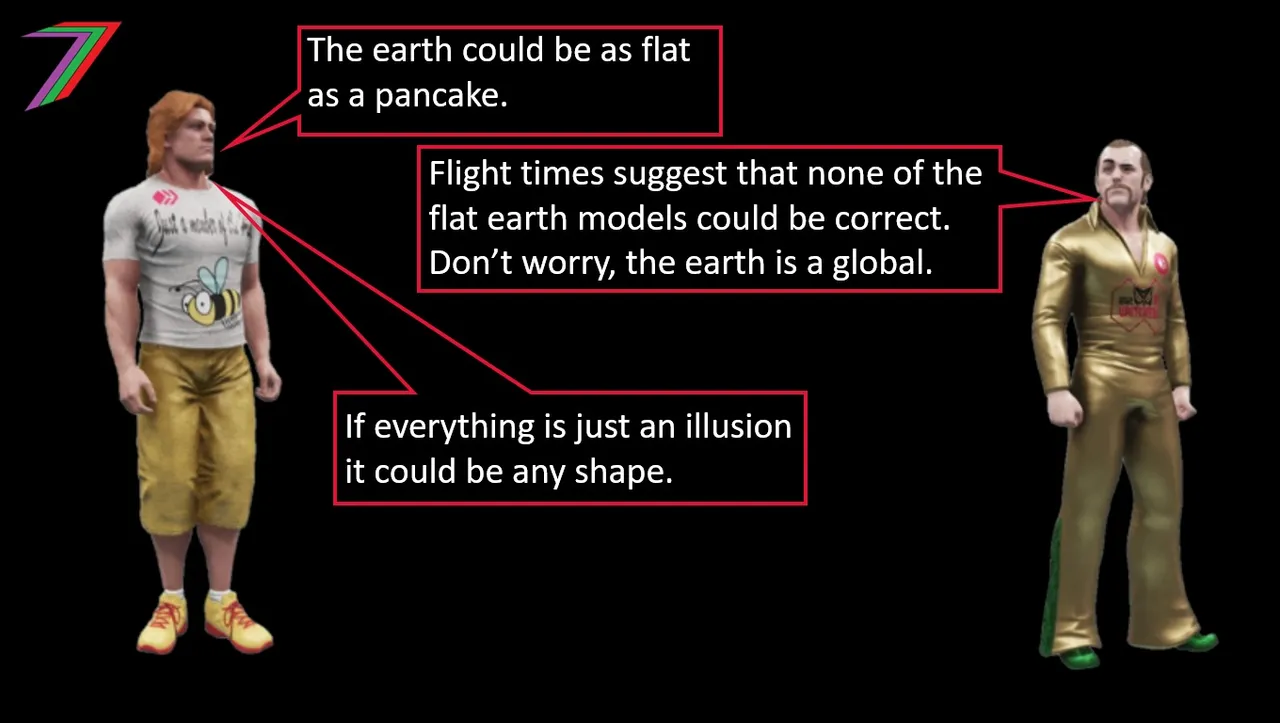
Conspiracy theories, more accurately ‘conspiracy beliefs’, are likely to be false, as they are not supported by evidence. Any form of false information poses a possible threat as it misleads people. This could cause people to behaviour in a dangerous or reckless manner. This could put themselves at risk as well as those around them. Despite this potential problem, I do not consider conspiracy theories to be a major threat.
Life is journey. When we are born, we know nothing. As we progress through life, we encounter various forms of stimuli. Some are more useful than others. We learn to decipher what is useful and what is not, and what is true and what is false. Encountering conspiracy theories is just another part of that journey. We need to explore the evidence presented to us. We need to consider our own personal bias. If information is freely available, we should be to identify conspiracy theories as well as false and misleading information.
Conspiracy theories along with any other type of misinformation or disinformation can become dangerous when there is censorship. When censorship is used to remove or reduce the circulation of conspiracy theories; disinformation; and misinformation, it creates echo chambers that reinforces them rather than challenges them. However, censorship is more often used to reinforce conspiracy theories, disinformation, and misinformation.
A good recent example of censorship has been the Ukraine war. The narrative of the war has been presented entirely from the perspective of Western Governments. Russian news media has been banned in many western countries. This makes it difficult to understand the Russian perspective. Instead, the western media wants to portray Russia and some of its allies as evil; while portraying the Kyiv Regime as purely righteous. This is reinforced by conspiracy theories/propaganda. In reality, arguably, actions from both sides have been immoral. All parties involved should be seeking a peaceful resolution as soon as possible.
Conclusion
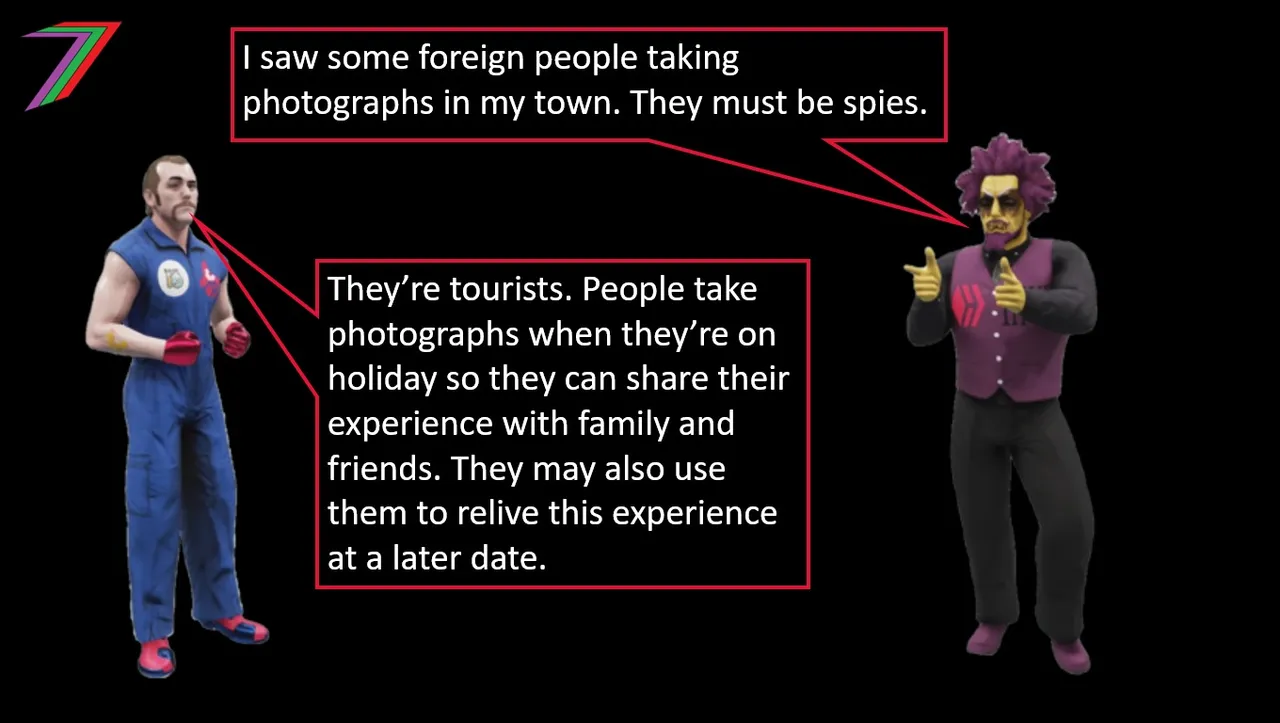
Conspiracy theories are not what they seem. Conspiracy theories are actually conspiracy beliefs, fantasies, or propaganda. Many things that are claimed to be conspiracy theories are not. Claims that are contrary to mainstream narratives are not always conspiracy theories. They are often evidence-based assessments of actions of Government, big business, media, and banks. The terminology conspiracy theory is used to disparage and discredit people who oppose Establishment narratives.
If we use the dictionary definitions, conspiracy theories can originate from anywhere. Some are supported by the Establishment and some are not. Some are created to cause harm to other parties while others are harmless.
Regardless of the intention of a conspiracy theory, if it can be openly challenged it poses little threat. This is because it can be discredited for all to see. Conspiracy theories become a much bigger and more dangerous problem if they are attacked or protected by censorship.
Censorship also erodes people's ability to critical think and analyse information and events. Prolonged exposure to limited ideology creates indoctrination. Even in the absence of censorship, people may not be able to analyse a situation critically. This is likely to cause them to ignore logic and even obvious facts.
More posts

I have several collection of posts. I have organised these collections based on content and purpose.
The first collection contains six collection posts created before PeakD had the collection feature. Four of these posts relate to the core of my content, one of them contains all my Actifit Posts, and one of them contains my video course ‘Economics is Everyone’.

The second collection consists of the posts that I consider define my channel. These posts are significant in terms of content as well as how they contribute to the growth of the channel. These posts reveal the most about what I believe in.

The third and fourth collection is what I call my ‘Freedom-base Economics living book’. They contain all the posts that support my ideas about the value and power of freedom. Some of these posts explain what we can achieve with freedom and what we need to utilise it. Some of them explain how we are deprived of freedom and how we often give up freedom for security and comfort. The third collection concludes with possible scenarios depending on what we (society) choose to do.


Hive: Future of Social Media
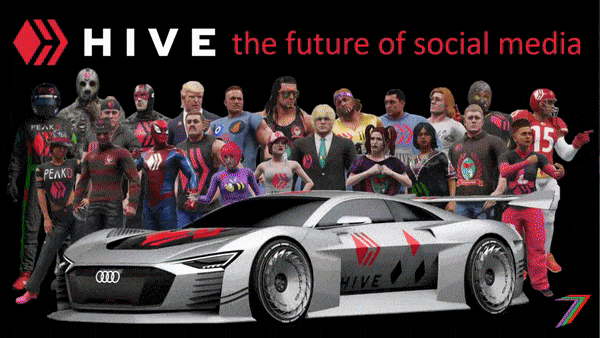
Spectrumecons on the Hive blockchain
